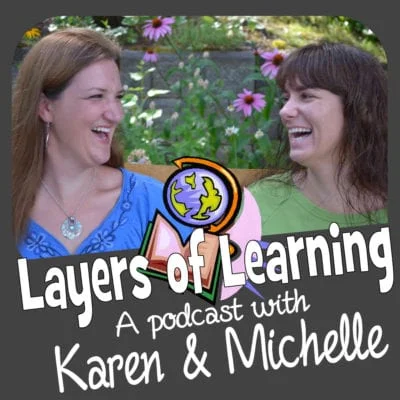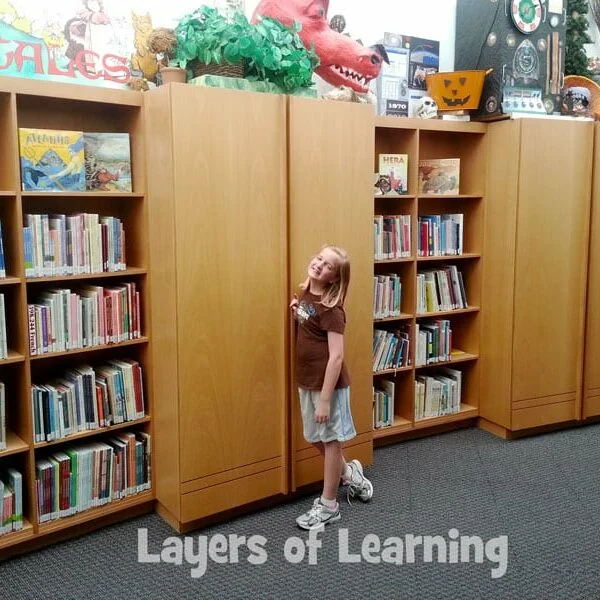
The Layers of Learning Podcast with Karen and Michelle is here to help you get your whole family learning together in your homeschool. We are the sisters behind Layers of Learning. We love getting together to chat about homeschooling and this podcast is just a series of our chats. We’re inviting you to listen in on our conversations.
We both have big families, but we teach almost all of our school subjects to everyone at once. We want to help you find the joy in that too, so we talk a lot about family homeschooling. To see all of our episodes, visit our Layers of Learning Podcast Page. Join us as we explore how to have a happy, hands-on, family-style homeschool.
library Lists

Every Layers of Learning unit begins with a Library List. One of the best parts about Layers of Learning is that you are teaching your kids how to learn, not just a list of facts. The library is an amazing resource for learning. We know that not every library has every book we recommend, and that’s why the Library List also includes search terms for you to use at your library. Whether you get one book or ten books on each topic, we hope you will dive into reading with your kids to really explore history, geography, science, and art together as a family. You aren’t intended to read every book and there is no absolutely required reading in any of Layers of Learning. The Library Lists are a tool to help you find great books and topics about the things you’re exploring as a family. In this episode, we walk you through the Library List resource and help you see how it should be used as well as offer tips for researching with your family.
Here Are A Few Topics You’ll Hear About In This Podcast
- Think of the Library Lists as tools, not requirements. You aren’t supposed to acquire or read every book from the lists. The Library List is a resource, not a checklist!
- Use the search terms at your library. Don’t spend a ton of money to acquire every single book.
- Talk with your library to find out what resources they have at your disposal – online book lists, book requests, interlibrary loans, digital resources, and more.
- When you have trouble finding books, use websites and YouTube videos.
- Keep a shelf or book basket of the books that accompany each unit and have your kids choose from that selection each day as they read.
- Instead of assigning pages, try assigning reading times. Have your kids spend a certain amount of time reading each day.
- You don’t have to read every book cover-to-cover. Feel free to pick out interesting snippets during your learning time. Highlight tidbits, read selections or chapters, and read picture books out loud to your whole family.
- In high school, kids will naturally gravitate to bigger books that are more advanced. They can read to younger siblings.
- During high school, think in terms of courses or semesters. If you assign reading, assign it for the semester and don’t worry about perfectly aligning with the unit.
- Instead of grading reading, give credit for whether or not they did it. You can also have your kids keep a reading log to track all of the books they’ve read.
- You are teaching your kids how to learn, so you don’t need to have perfection or checklists. Let the learning happen naturally.
Podcast: Play in new window | Download
Subscribe: Apple Podcasts | Spotify | Podcast Index | Email | Deezer | RSS | More
Get a Free Unit
Choose between the first unit in each Layers of Learning subject to try for free when you sign up for the newsletter.
We never spam and you can cancel your subscription at any time.

